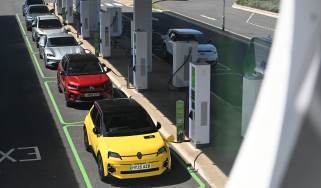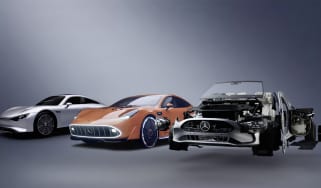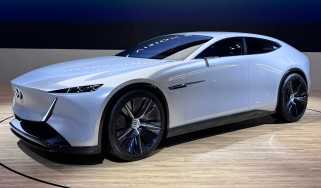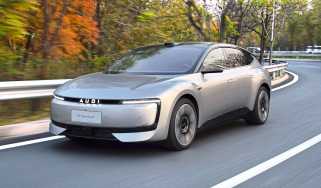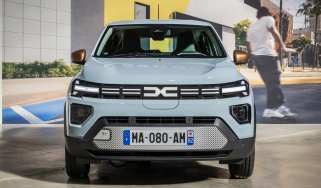Hydrogen cars: are hydrogen fuel-cell cars the future?
Electric cars are entering the mainstream at full force, but do hydrogen cars also have a future on our roads?
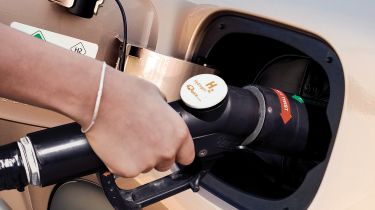
Electric cars are being pitched as the future, and EVs are indeed pouring onto the market at a blistering rate, but some manufacturers are still experimenting with hydrogen cars as well. So does this alternative fuel really have a future? We explain everything you need to know.
What is a hydrogen car?
A hydrogen car is a car that is (you guessed it) powered by hydrogen. The reason why hydrogen is the natural gas of choice here isn’t just because it’s one of the most abundant in the known universe, but it's also a useful and clean source of energy, whether being used to generate electricity in a fuel cell, or being burned in a special combustion engine.
There are many different sizes of hydrogen car, too, with everything ranging from superminis to supercars being able to be powered by this alternative fuel. Most of these vehicles are either prototypes or concepts at the moment, but they do give some idea of the potential of hydrogen power.
How do hydrogen cars work?
There are actually two types of hydrogen-powered car. The first, and more common, is known as a hydrogen fuel cell electric vehicle (often abbreviated to FCEV). In these cars, the hydrogen is stored in a high-pressure tank and then combined with oxygen in a fuel cell stack to generate electricity. This power is then used to provide charge to a battery pack, which in turn powers electric motors which drive the car (similar to the setup in a regular electric car).
The other type of hydrogen car is a hydrogen combustion vehicle. These cars are fitted with a combustion engine, but it is specifically engineered to burn hydrogen instead of traditional fuels. Having a traditional engine means these cars still come with an exhaust pipe, but as hydrogen only produces water when it combusts, there are no CO2 emissions to worry about. This setup has been used in motorsport and a number of prototype road cars by brands including Toyota and Alpine.
How to refuel a hydrogen car
If you can find a place to buy it, refuelling a hydrogen car is very similar to filling up with petrol or diesel. You simply drive up to a pump (usually located on a station forecourt), open the car’s filler flap and insert the nozzle.
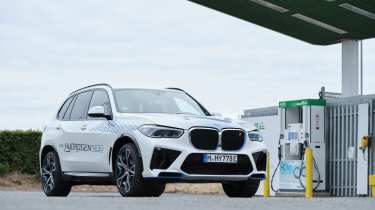
Filling up with hydrogen is also almost as quick as traditional refuelling, too, as it takes around 5 minutes to fill a tank. This is undoubtedly an advantage over the long waiting times associated with charging a battery electric car, even when using a rapid charger.
There are currently six hydrogen filling stations in the UK that are open to the public, but this number has fallen in recent years, so finding hydrogen stations has become a little more difficult than it used to be.
| Name | Location |
| Aberdeen Hydrogen Centre (Aberdeen City Council) | Aberdeen – AB12 3FT |
| Hydrogen Refuelling (BOC) | Aberdeen – AB25 3RF |
| Motive Fuels (ITM Power) | Birmingham - B25 8DW |
| Hatton Cross (ITM Power) | London – TW6 2GE |
| AMP (ITM Power) | Sheffield – S60 5WG |
| Honda Manufacturing (BOC) | Swindon - SN3 4QS |
Hydrogen cars available in the UK
At the time of writing, there are only two mainstream hydrogen-powered cars on sale in the UK. However, these models have only sold in fairly small numbers, and it would appear that their time may soon be coming to an end.
Toyota Mirai
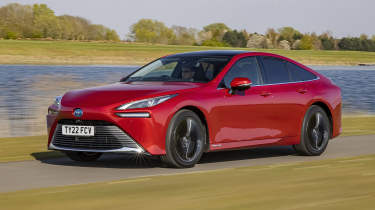
Toyota is no stranger to experimenting with cleaner fuels, and the Toyota Mirai is the brand’s first-ever mainstream hydrogen car, now in its second generation. This futuristic-styled family car can cover over 300 miles on a single tank of hydrogen, but prices have climbed well above £60,000.
Hyundai Nexo
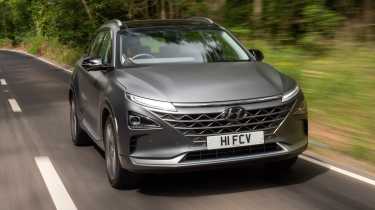
SUVs are big business in the UK, and the Hyundai Nexo is the Korean brand’s solution for those who don’t quite fancy an electric SUV but do want to cut out their exhaust emissions. With 461 litres of boot space and a spacious cabin, the Nexo is ideal for family use. However, it also sits firmly north of the £60,000 mark.
More hydrogen-powered cars could soon be on the way, though, with brands such as BMW, Toyota and Vauxhall continuing to experiment with this alternative fuel.
Pros and cons of hydrogen cars
Hydrogen cars offer some very promising eco credentials, but this new fuel is also currently being held back by some flaws that cannot be ignored. Here are some of the key pros and cons of hydrogen cars:
Pros
- Only water is produced whether combusted or used in a fuel cell.
- Quick and easy to refuel.
- Easy to achieve hundreds of miles between fill-ups.
Cons
- Cars are currently very expensive to buy.
- UK hydrogen infrastructure is severely undersized.
- Hydrogen production still has a notable environmental impact.
Can hydrogen save the ICE engine?
Fuel cells are not the only option for H2, and there’s plenty of interest in using the gas to power internal combustion engines. JCB, for example, has previously installed its own hydrogen-fuelled engine in a truck. “There is no reason we should not see hydrogen combustion engines in vehicles used on the roads in the future, including cars.” said Chairman Lord Bamford at the vehicle launch, but most mainstream car manufacturers are currently less bullish.
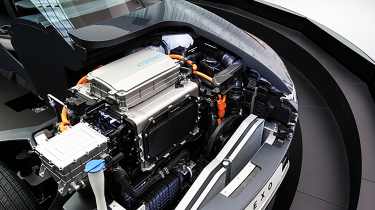
Toyota believes H2 ICE has a place in motorsport, where fans want to hear the sound of traditional engines, but in spite of revealing its Corolla Cross – a GR-based SUV concept with an H2-fuelled 1.6-litre engine and space for five passengers – it maintains H2 ICE tech is only 40 per cent along the road to commercialisation. “It is not yet possible to say if the technology will reach maturity for road cars,” the company stated.
What’s the future for hydrogen cars?
For truly sustainable mobility, hydrogen is a fuel that cannot be ignored. It is also regarded as a potential alternative for fuelling HGVs, where electric trucks are hampered by battery capacity and having to recharge using the power grid. The biggest downside, though, is that developing a full hydrogen refuelling infrastructure, where the gas is produced and then transported to stations, will take billions of pounds and a number of years to develop.
The key to encouraging hydrogen vehicles is by making them part of a wider ‘hydrogen economy’ – building refuelling stations for hydrogen cars alone would be inefficient. Instead, ideally, the whole energy sector would incorporate hydrogen into the mix, from refuelling cars to storing energy for homes. Another benefit of hydrogen is that it can potentially be produced on site rather than being transported like fuel, or supplied through the grid like electricity.
The industry is exploring ways to use existing natural gas distribution grids for easy transport of renewable hydrogen across countries and under the ocean floor. Research at Birmingham University in the UK, and elsewhere, heralds a distribution network where hydrogen can be mixed into natural gas flowing through the domestic supply grid, then separated out again where hydrogen fuel is needed – be that for industry, or transport.
The Hydrogen Council (an industry body) has predicted there could be 13 million fuel cell vehicles in operation globally as soon as 2030, including 1 million vans, trucks and buses. To many that will sound implausible, given that there are so few fuel cell cars registered globally to date.
Some manufacturers are starting to have second thoughts about hydrogen, too, as Stellantis axed its Hydrogen Pro One fuel cell van project only months before the planned roll-out onto the European market. The firm considered the idea to be too much of a financial risk, due to questionable demand and a lack of infrastructure. This raises the question of whether more car and van brands will follow suit.
How efficient are hydrogen cars?
One of the arguments that’s sometimes made against hydrogen vehicles is that they’re less efficient than EVs. Because hydrogen doesn’t occur naturally, it has to be extracted and then compressed in fuel tanks. It then has to mix with oxygen in a fuel cell stack to create electricity to power the car’s motors. Cynics point to the efficiency loss in this process when compared with a regular electric car, where electricity comes straight from a battery pack that’s charged from the mains.
That’s true to an extent, but hydrogen-powered cars are not really expected to replace EVs. Instead, hydrogen is intended to complement pure-electric power, and there’s a good reason for this: it is the cleanest fuel possible.
Lithium-ion battery production for electric cars is very energy-intensive, with Lithium mining alone emitting tonnes of CO2. If you take this into account along with charging the battery from anything other than a zero-emission source throughout its lifetime, an electric car still contributes a certain amount of CO2 emissions – even if this does not originate from an exhaust.
Of course, if an EV battery is produced using responsibly sourced materials and renewable energy, this helps to lower these overall emissions further.
In comparison, today’s hydrogen cars have life-cycle emissions that are at least as low as that of EVs. They don't need large batteries as the fuel cell works to turn hydrogen into electricity to drive the motors. A recent study found that a hydrogen car emits around 120g/km of CO2 over its lifetime, but this can be brought down significantly to around 60g/km when hydrogen is produced using renewable energy.
Hydrogen cars FAQs
Frequently Asked Questions
Although there are a number of reasons why hydrogen cars haven’t made it into the mainstream, one of the biggest problems with h2 as a fuel is that it’s notably expensive to produce and store. Add this to a lack of infrastructure and investment, and very few car brands are willing to take this potentially enormous financial gamble.
Hydrogen isn’t the only alternative to electric power, now find out more synthetic fuels...


